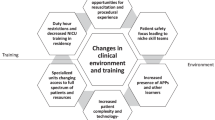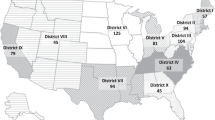Abstract
There is a growing need for advanced practice providers in the NICU. Physician assistants (PAs) with postgraduate training in neonatology can help meet these demands. The premise of training PAs to work in the NICU is being adopted by multiple centers nationwide. Unfortunately, there are no standardized curricula for neonatal PA training that can be utilized to initiate residencies. Since our program is the longest running neonatal PA residency in the nation, we are in a unique position to share the accumulated experiences of our curriculum development. In this article, we describe our neonatal PA residency as it exists today with selected lessons learned. In addition, we present mixed qualitative and quantitative assessments of graduates. We believe that neonatal PA residency graduates become ideal candidates to fill the growing national need. We propose that our model program can be a stepping stone to enhance the role of PAs in neonatal care.
This is a preview of subscription content, access via your institution
Access options
Subscribe to this journal
Receive 12 print issues and online access
$259.00 per year
only $21.58 per issue
Buy this article
- Purchase on Springer Link
- Instant access to full article PDF
Prices may be subject to local taxes which are calculated during checkout

Similar content being viewed by others
References
Reynolds EW, Bricker JT. Nonphysician clinicians in the neonatal intensive care unit: meeting the needs of our smallest patients. Pediatrics. 2007;119:361–9.
Freed GL, Moran LM, Dunham KM, Nantais-Smith L, Martyn KK. The Research Advisory Committee of the American Board of Pediatrics Capacity of, and demand for, neonatal nurse practitioner educational programs: a missing piece of the workforce puzzle. J Prof Nurs. 2015;31:318–22.
Pressler JL, Kenner CA. The NNP/DNP shortage: transforming neonatal nurse practitioners into DNPs. J Perinat Neonatal Nurs. 2009;23:272–8.
Kaminski MM, Meier S, Staebler S. National association of neonatal nurse practitioners (NANNP) workforce survey. Adv Neonatal Care. 2015;15:182–90.
Freed GL, Dunham KM, Moran LM, Spera L. Research Advisory Committee of the American Board of P Resident work hour changes in children’s hospitals: impact on staffing patterns and workforce needs. Pediatrics. 2012;130:700–4.
American Academy of Physician Assistants. https://www.aapa.org.
Accreditation Review Commission on Education for the Physician Assistant. https://www.arc-pa.org.
17th Edition of PA State Laws and Regulations. https://www.aapa.org/advocacy-central/state-advocacy/state-laws-and-regulations/.
Wiler JL, Ginde AA. State laws governing physician assistant practice in the United States and the impact on emergency medicine. J Emerg Med. 2015;48:e49–58.
Mileder LP, Schmolzer GM. Simulation-based training: the missing link to lastingly improved patient safety and health? Postgrad Med J. 2016;92:309–11.
Donnon T, Al Ansari A, Al Alawi S, Violato C. The reliability, validity, and feasibility of multisource feedback physician assessment: a systematic review. Acad Med. 2014;89:511–6.
Li ST, Burke AE. Individualized learning plans: basics and beyond. Acad Pediatr. 2010;10:289–92.
Li ST, Paterniti DA, Co JP, West DC. Successful self-directed lifelong learning in medicine: a conceptual model derived from qualitative analysis of a national survey of pediatric residents. Acad Med. 2010;85:1229–36.
National Commission on Certification of Physician Assistants. http://www.nccpa.net/newsletter.aspx. Accessed on 10 Dec 2017.
Creswell JW. Five qualitative traditions of inquiry. In Qualitative inquiry and research design. Thousand Oaks, CA: SAGE; 1998. p. 61–8.
Bazeley P, Jackson K. Basic coding. In Qualitative data analysis with NVIVO. Thousand Oaks, CA: SAGE; 2013.
Parmekar S, Arnold JL, Anselmo C, Pammy M, Hagan J, Fernandes CJ, et al. Mind the gap: can videolaryngoscopy bridge the competency gap in neonatal endotracheal intubation among pediatric trainees? a randomized controlled study. J Perinatol. 2017;37:979–83.
Bismilla Z, Finan E, McNamara PJ, LeBlanc V, Jefferies A, Whyte H. Failure of pediatric and neonatal trainees to meet Canadian Neonatal Resuscitation Program standards for neonatal intubation. J Perinatol. 2010;30:182–7.
DeMeo SD, Katakam L, Goldberg RN, Tanaka D. Predicting neonatal intubation competency in trainees. Pediatrics. 2015;135:e1229–36.
Duffin C. New kid in town. Nurs Stand. 2004;19:12–3.
Schell GJ, Lavieri MS, Jankovic F, Li X, Toriello A, Martun KK, et al. Strategic modeling of the neonatal nurse practitioner workforce. Nurs Outlook. 2016;64:385–94.
Acknowledgements
We acknowledge the role and support of former residency directors Eric Reynolds MD and Lauren Jackson-Belcher PA-C, former pediatric chairpersons J. Timothy Bricker MD and Carmel Wallace MD, current chairperson Scottie Day MD, administrative director Rania Omar Burke MPH, former and current neonatology directors Henrietta Bada MD and Peter Giannone MD, respectively, our review and advisory board members Wendy Hansen MD, Lindsay Ragsdale MD, Ana Ruzic MD, Bradford Schwarz PA-C, Thitinart Sithisarn MD, and subspecialty rotation directors Niraj Chavan MD, Rebecca Collins MD, and Majd Makhoul MD.
Author contributions
EGAJ designed and conceptualized the study, conducted data collection, and interpretation of the quantitative sections. He participated in draft revisions, and approved the final draft. FH-F participated in development of the study plan, conducted all qualitative interviews, analyzed the qualitative data, wrote the qualitative sections, participated in draft revisions, and approved the final draft. TK and MDC designed and conceptualized the study and participated in draft revisions, and approved the final draft.
Author information
Authors and Affiliations
Corresponding authors
Ethics declarations
Conflict of interest
The authors declare that they have no conflict of interest.
Additional information
Publisher’s note: Springer Nature remains neutral with regard to jurisdictional claims in published maps and institutional affiliations.
Supplementary information
Rights and permissions
About this article
Cite this article
Abu Jawdeh, E.G., Hardin-Fanning, F., Kinnard, T.B. et al. Neonatal postgraduate training program for physician assistants: meeting a need in neonatal care. J Perinatol 39, 746–753 (2019). https://doi.org/10.1038/s41372-019-0350-9
Received:
Revised:
Accepted:
Published:
Issue Date:
DOI: https://doi.org/10.1038/s41372-019-0350-9
This article is cited by
-
Promoting mental well-being among parents in the neonatal intensive care unit: a perspective on the role of Physician Associates
Journal of Perinatology (2024)
-
Essentials of Neonatal-Perinatal Medicine fellowship: an overview
Journal of Perinatology (2022)



